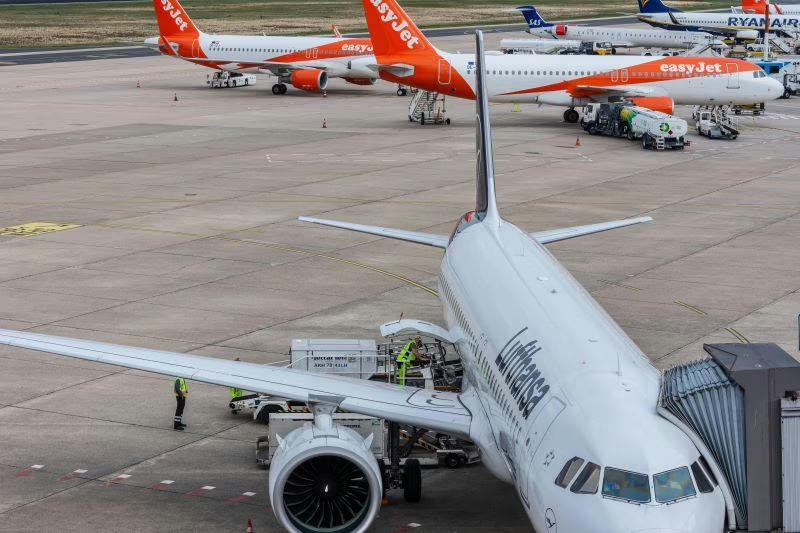
BRUSSELS—European airline CEOs are forecasting strong travel demand for summer 2023, and despite supply chain and engine delays affecting operations, predict the industry is better prepared for the peak season than in 2022 when airport staff shortages caused extensive disruption.
Speaking at the Airlines for Europe (A4E) summit March 29 in Brussels, A4E’s CEOs also renewed calls for airspace reforms, which they said would increase efficiency and provide a short-term way to reduce emissions. Reforms would also provide better management of air space to protect overflights in the event of national air traffic control strikes, which have been affecting European airspace in recent weeks, they said.
Some airline operators have been forced to wet-lease capacity to deal with engine and supply chain-linked shortfalls affecting their fleets.
Latvian carrier airBaltic said March 27 it would be wet-leasing more aircraft from March 27 to May 31 to mitigate the impact of delays in engine maintenance by Pratt & Whitney. The move comes a few weeks after airBaltic announced a separate wet-lease deal for four Airbus A320s from Avion Express to help it meet increasing demand and deal with supply chain issues.
AirBaltic CEO Martin Gauss told Aviation Daily that its latest wet lease announcement was because of a short-notice change to the engine return schedule it had agreed to with Pratt & Whitney. The carrier’s earlier plan to lease Avion Express aircraft had allowed it time to make changes to interiors to bring them closer to airBaltic standards, but that was not the case with the latest deal, he said.
“We have a weekly forecast of the engines coming back, they changed it by an extreme number, which caused us to short-term take in more wet leases,” Gauss said. “The engine itself is a good engine but this technology needs years of development. It will be years from now until the engine has the maturity level which the CFM56 engine has.”
Lufthansa group CEO Carsten Spohr also told Aviation Daily that supply chain issues were affecting operations. “One-third of our A220s are on the ground in Switzerland. That is due to engine issues,” he said. “It’s only 20 aircraft, but six are on the ground.” Lufthansa Group airline SWISS has a fleet of 21 A220s, powered by Pratt & Whitney engines.
EasyJet CEO Johan Lundgren said, “It’s well documented that both Boeing and Airbus are suffering supply chain issues, we’re working with Airbus to make sure we can mitigate some of that.”
Lundgren added there could be small adjustments as a result. “We’re sticking to our plans in terms of fleet numbers, but it will be a combination of perhaps getting some operating leases in or it may be that you’re delaying having an aircraft leaving the fleet as well,” he said. “We will have the numbers that we set out to do for this year, and we don’t expect to have any changes with these numbers for next year. By the time we reach that, the view from Airbus is that they will try to resolve a lot of these things.”
Spanish LCC Volotea, which is not affected by the current supply chain issues because of its strategy of using a “mid-life” fleet of A320 aircraft which are typically 8-10 years old, is looking forward to a strong summer, CEO Carlos Muñoz told Aviation Daily.
“We don’t have the issues with the LEAPs, but indirectly, the fact that the neos and the MAXs are seeing so many issues is causing a temporary increase in demand for the ceo technology,” Muńoz said. He described the situation as “borrowed demand” as other carriers seek to keep older aircraft longer in their fleets.
Volotea is looking forward to strong demand after carrying 7.5 million passengers in 2019, 9.5 million in 2022, and this year is expecting 10.5-11 million, Muñoz said.
SES2+ Push
“We have solid demand into the summer,” easyJet’s Lundgren said. “Airlines—certainly ourselves—have run through making sure that everything we can control, we are confident we’ve done what we can.”
Problems could occur in the event of strikes and reroutings, he said. “I still do believe the time the industry has had to set ourselves up for this summer means that in general it is better prepared,” Lundgren said. “But we do need to add on 50% more customers into the system with a reduced airspace because of the war in Ukraine.”
Airline CEOs also said long-stalled Single European Sky reforms could have a big and immediate impact on sustainability efforts. The argument contrasts with other longer-term solutions to cutting the sector’s emissions, such as SAF, which is expensive and scarce, and future hydrogen technologies, which are some years off deployment.
Lundgren said easyJet could save 19% of its fuel on a Paris-Milan flight if it could fly an optimized route.
Incoming A4E Chair and International Airlines Group (IAG) CEO Luis Gallego said, “At A4E, we are calling for the European Commission, European Parliament and Member States to take part in discussions and make progress on the Single European Sky implementation and the EU Commission’s proposed legislation (SES2+). We would like all parties to put their differences aside and focus on delivering change which would be a win for passengers, the environment and Europe as a whole.”
